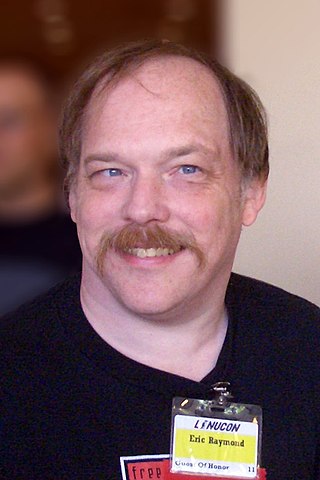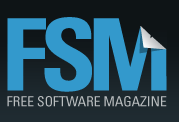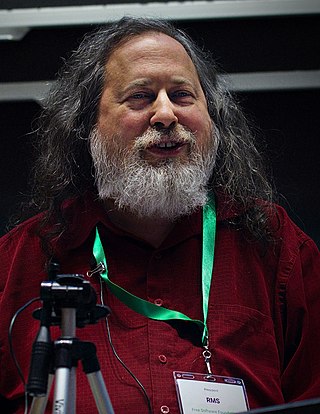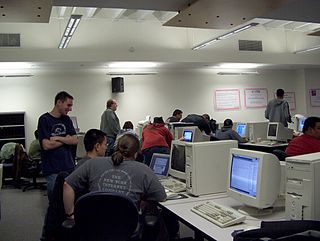
Bruce Perens is an American computer programmer and advocate in the free software movement. He created The Open Source Definition and published the first formal announcement and manifesto of open source. He co-founded the Open Source Initiative (OSI) with Eric S. Raymond.

Eric Steven Raymond, often referred to as ESR, is an American software developer, open-source software advocate, and author of the 1997 essay and 1999 book The Cathedral and the Bazaar. He wrote a guidebook for the Roguelike game NetHack. In the 1990s, he edited and updated the Jargon File, published as The New Hacker's Dictionary.

Free software, libre software, or libreware is computer software distributed under terms that allow users to run the software for any purpose as well as to study, change, and distribute it and any adapted versions. Free software is a matter of liberty, not price; all users are legally free to do what they want with their copies of a free software regardless of how much is paid to obtain the program. Computer programs are deemed "free" if they give end-users ultimate control over the software and, subsequently, over their devices.

Calligra Words is a word processor, which is part of Calligra Suite and developed by KDE as free software.

Groklaw is a website that covered legal news of interest to the free and open source software community. Started as a law blog on May 16, 2003, by paralegal Pamela Jones ("PJ"), it covered issues such as the SCO-Linux lawsuits, the EU antitrust case against Microsoft, and the standardization of Office Open XML.

Free Software Magazine is a Web site that produces a mostly free-content online magazine about free software.

Rishab Aiyer Ghosh is a Dutch journalist, computer scientist, open-source software advocate and software entrepreneur. He was a founder of Topsy, a social search and analytics company that was acquired by Apple Inc in December 2013.
Alternative terms for free software, such as open source, FOSS, and FLOSS, have been a controversial issue among free and open-source software users from the late 1990s onwards. These terms share almost identical licence criteria and development practices.

Benjamin Mako Hill is a free software activist, hacker, author, and professor. He is a contributor and free software developer as part of the Debian and Ubuntu projects as well as the co-author of three technical manuals on the subject, Debian GNU/Linux 3.1 Bible, The Official Ubuntu Server Book, and The Official Ubuntu Book.

Richard Matthew Stallman, also known by his initials, rms, is an American free software movement activist and programmer. He campaigns for software to be distributed in such a manner that its users have the freedom to use, study, distribute, and modify that software. Software that ensures these freedoms is termed free software. Stallman launched the GNU Project, founded the Free Software Foundation (FSF) in October 1985, developed the GNU Compiler Collection and GNU Emacs, and wrote all versions of the GNU General Public License.

Linux Libertine is a digital typeface created by the Libertine Open Fonts Project, which aims to create free and open alternatives to proprietary typefaces such as Times New Roman. It was developed with the free font editor FontForge and is licensed under the GNU General Public License and the SIL Open Font License.

Luis Villa is an American attorney and programmer who worked as Deputy General Counsel and then as Senior Director of Community Engagement at the Wikimedia Foundation. Previously he was an attorney at Mozilla, where he worked on the revision of the Mozilla Public License (MPL). He continued that work in his next job at Greenberg Traurig where he was part of the team defending Google against Oracle's claims concerning Android. Prior to graduating from Columbia Law School in 2009, he was an employee at Ximian, which was acquired by Novell in 2003. He spent a year as a "senior geek in residence" at Harvard's Berkman Center for Internet & Society working on StopBadware.org. He has been elected four times to the board of the GNOME Foundation. He was editor-in-chief of the Columbia Science and Technology Law Review, and blogs regularly. He was a director of the Open Source Initiative from April 2012 to March 2015.

A Linux User Group or Linux Users' Group (LUG) or GNU/Linux User Group (GLUG) is a private, generally non-profit or not-for-profit organization that provides support and/or education for Linux users, particularly for inexperienced users. The term commonly refers to local groups that meet in person but is also used to refer to online support groups that may have members spread over a very wide area and that do not organize, or are not dependent on, physical meetings. Many LUGs encompass FreeBSD and other free-software / open source Unix-based operating systems.

BLAG Linux and GNU is a discontinued Linux distribution that was made by the Brixton Linux Action Group.

The Libre Graphics Meeting (LGM) is an annual international convention for the discussion of free and open source software used with graphics; The first Libre Graphics Meeting was held in March 2006. Communities from Inkscape, GIMP, Krita, Scribus, sK1, Blender, Open Clip Art Library, Open Font Library, and more come together through the Create Project to assemble this annual conference. It was co-founded by Dave Neary and Dave Odin.

LibreOffice is a free and open-source office productivity software suite, a project of The Document Foundation (TDF). It was forked in 2010 from OpenOffice.org, an open-sourced version of the earlier StarOffice. It consists of programs for word processing; creating and editing spreadsheets, slideshows, diagrams, and drawings; working with databases; and composing mathematical formulae. It is available in 115 languages. TDF does not provide support for LibreOffice, but enterprise-focused editions are available from companies in the ecosystem.
The Document Foundation (TDF) is a non-profit organization that promotes open-source document handling software. It was created by members of the OpenOffice.org community to manage and develop LibreOffice, a free and open-source office suite, and is legally registered in Germany as a Stiftung. Its goal is to produce a vendor-independent office suite with ODF support in a development environment free from company control.

Apache OpenOffice (AOO) is an open-source office productivity software suite. It is one of the successor projects of OpenOffice.org and the designated successor of IBM Lotus Symphony. It was a close cousin of LibreOffice, Collabora Online and NeoOffice in 2014. It contains a word processor (Writer), a spreadsheet (Calc), a presentation application (Impress), a drawing application (Draw), a formula editor (Math), and a database management application (Base).

Asturix OS is a discontinued Linux distribution based on Ubuntu. It is no longer maintained.

Outreachy (previously the Free and Open Source Software Outreach Program for Women) is a program that organizes three-month paid internships with free and open-source software projects for people who are typically underrepresented in those projects. The program is organized by the Software Freedom Conservancy and was formerly organized by the GNOME Project and the GNOME Foundation.
















